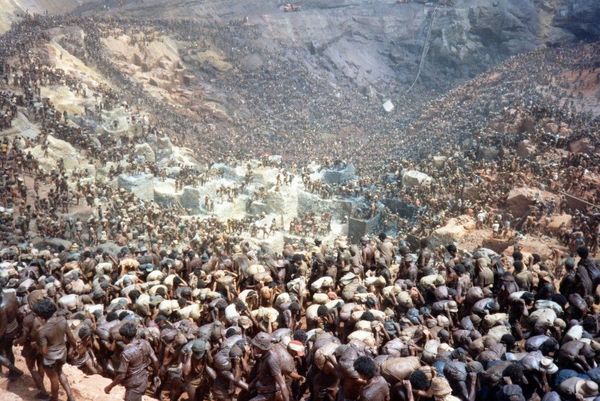Eye For Film >> Movies >> Serra Pelada - The Legend Of The Gold Mountain (2013) Film Review
Serra Pelada - The Legend Of The Gold Mountain
Reviewed by: Rebecca Naughten

Situated in northern Brazil, in 1979 Serra Pelada - Bald Mountain - was accidentally discovered to be the site of one of the world's largest deposits of gold, kickstarting a story of obsession, outrageous fortune, and confrontation that is still ongoing. The region was well-known as a rich source of iron ore, meaning that multinational drilling companies were advantageously already in the area when the discovery was made, but it was the actions of the locals that would shape the Serra Pelada mine into a legend of international fame.
As soon as word got out that gold had been found, the area was besieged by more than 10,000 independent prospectors - garimpeiros - and at its peak there were 100,000 men on site. There is a strange beauty to the archive footage that shows the mountainside as a hive of activity made up of an undulating mass of indistinguishable bodies caked in mud, almost as if the men were of the earth themselves. What they achieved without the aid of machinery is Biblical in scale - a mountain that was 140 metres high would become a lake 150 metres deep.

Although the mine became an intermittent flashpoint for confrontation between workers and the State, the gold was a governmental form of regional control in relation to social unrest caused by overcrowding and the torture, murder, and disappearance of left-wing guerrillas. In fact, the government’s man in Serra Pelada, Sebastião Rodrigues de Moura a.k.a. Major Curió (a strange cross between Joseph Conrad’s Kurtz and a sinister but sentimental version of Boris Johnson), is the man believed to be responsible for those very crimes (a truth commission investigating politically-motivated crimes under Brazil’s military dictatorship started pretrial proceedings against him last year). That is not dwelt on here but Serra Pelada became Curió's de facto fiefdom.
There’s a fascinating story to be told but the title is the giveaway that the film is more interested in the 'legend' of Serra Pelada than in digging out an objective and coherent overview. Despite the tale starting in the late-Seventies, and the vast array of archival footage utilised, little background is given in terms of Brazil as a military dictatorship in that era, or its transition to democracy, which unfortunately denies the viewer a degree of contextualisation in relation to the multiple government interventions in the mine. Poorly placed subtitles also add to the lack of context as they overlay the names and professions of those interviewed.
Perhaps it is not so much lack of objectivity as the lack of a clear authorial voice that made the film an unsatisfactory experience for this viewer. The versions of events presented don't seem wholly reliable and the subjectiveness of 'truth' is illustrated via the cacophony of voices heard. They, in turn, highlight the problem with sifting through differing recollections - at many years remove - when a story has taken on mythic proportions and entered into folklore. The absence of social or political context makes it difficult to judge the veracity of what we're told. The only point of consistency is the frequency with which the ‘ownership’ of the land changed hands at the behest of successive governments.
Part of the unsatisfactory nature of the film's emphasis on 'the legend', is that Curió - who is interviewed in isolation in the present, unlike the garimpeiros who are often in groups - is not challenged in any way. At an editorial level, the juxtaposition of soundbites from other people occasionally undermines his glorified version of events but otherwise the darker side of his control is only hinted at. The shantytown that sprang up in vicinity to the mine - charmingly described as 'stores and whores' - would later become a town bearing his name (Curionópolis) and his shadow hangs over the area to this day.
Meanwhile for the garimpeiros, this is a story of ever-decreasing returns as their collective stake in the mine grew smaller and smaller through a combination of political skullduggery and multinational clout. Some of them made substantial fortunes at the time (millions of US dollars in some cases) but in the eyes of the men who were there at the start we see the madness that gold can inflict - these old men repeatedly returning to, or simply not leaving, Serra Pelada in the unwavering certainty that the gold will come again.
The mine officially closed in 1986 after a series of collapses made it unsafe and water filled the hole, but the continued presence of the drilling companies has convinced these garimpeiros that there must be some way to get to the remaining gold, something that is borne out by news reports towards the close of the film. But whether they will see a share of those riches is uncertain, with more than one of them pointing out that time is not on their side - "A person lives for 60 years, a company plans for a century".
Reviewed on: 29 Mar 2014














